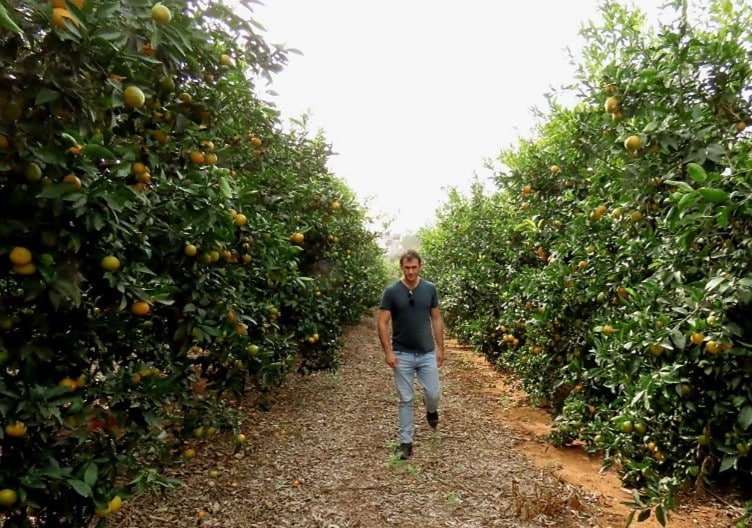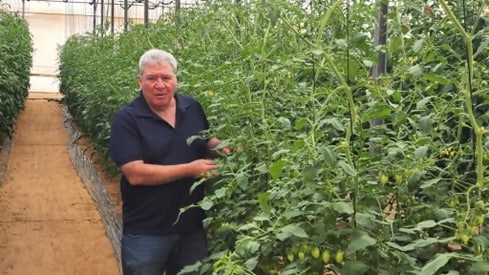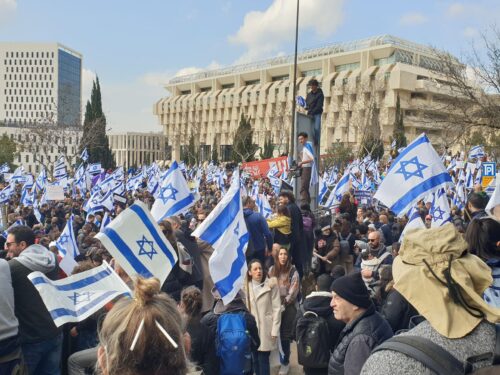Orchard farming in Israel has been deep in crisis since October 7; and conditions are only worsening, with the harvest season under way and fruit falling to the ground for want of laborers. The crisis is particularly painful because the farmers see themselves as part of Israel’s active security perimeter — as proven on October 7. We spoke with Daniel Klusky, Secretary General of the Israel Citrus Growers Association, and with Yankele Moskowitz, chair of the committee on foreign workers at the Farmers’ Federation of Israel, in order to understand the situation and explore how it can be changed.
75% of the workers are Palestinian
“They say, ‘Where the plow passes, there the border passes,’ remarks Daniel Klusky, “but remember that the plow doesn’t pass through the city. Where it passes is alongside the agricultural communities — the villages, moshavim, and kibbutzim — and on that vile Sabbath, we saw how the farmers in those places are the border guards. The farm sector proved that besides providing food, it provides security. The farmers showed their heroism and filled a role in the fighting.”
But although the farmers do fill an active role in the fighting, the state isn’t providing alternatives to solve the crisis that has beset the farmers since the entry of foreign workers was forbidden. “The state decided not to let Palestinians in. I understand why, but it’s been three months and they haven’t come up with any alternative solution for the farmers who were employing Palestinians, and the damage is increasing. Not just immediate damage, but lasting damage. If pruning doesn’t start, there won’t be summer fruits, and if the citrus isn’t picked, the damage will continue into next year too,” says Yankele Moskowitz, who chairs the committee on foreign workers at the Farmers’ Federation of Israel.

The workforce crisis is currently intensifying in the citrus sector especially. In orchard farming, 75% of the workers are Palestinians, but since the start of the war the only Palestinians crossing in have been 8,000 who are allowed to work in the industrial zones of the Judea and Samaria area. “Since the war began, I’m at the Knesset every week,” says Klusky. “Sometimes more than once a week. The Ministry of Agriculture sends me to the Ministry of Finance. From there I get sent to the Population and Immigration Authority. It’s nothing but a joke.”
The farmers have suggested several possible solutions to the crisis, for example permitting a quota of seasonal workers for the citrus sector or allocating workers to be divided among pairs of farmers who need temporary labor during different seasons so that each worker would have a summer employer and a winter employer. But the state, according to the farmers, is dragging its feet.
“If you leave agriculture, you don’t come back.”
Klusky says: “I brought two more farmers with me to the Knesset. At this time of year, they’d normally be employing 120 workers apiece. Today they have between 6 and 15, from Thailand. Output is down from hundreds of thousands of tons of fruit per month to scarcely some dozens. In the orchards, 1.6 billion shekels are hanging on the trees and, with the amount of labor available, the fruit just falls to the ground. So what’s going to happen? People will go bankrupt and sell out their farms, and if you leave agriculture, you don’t come back.”
Israel’s orchards cover 38 thousand acres, spread all across the country from Kibbutz Eilot in the south to the vicinity of Metula in the north, but 70% of the orchards are in the central area, between Gedera and Hadera. Each area has its own growing conditions and its own crops: the Arava has pomelos, the north has grapefruit, and the center has everything. Although there are no war zones in the center, still — according to Klusky — there isn’t a single orchard operating at full capacity there. “What we’re doing is picking for the local market to begin with. Exports are second priority. We’re loyal to our country, and we don’t want shoppers to find that the supermarket has no oranges or lemons. We want our country’s own citizens to be the ones who enjoy our produce.”
Both our interviewees bring up the importance of agriculture to the country’s security, above and beyond the economic factor. “More than a decade ago, Israel almost signed an agreement to import water from Turkey by ship. But on second thought, at the last minute, it came to its senses and decided to build desalination plants. What would have happened if we’d needed to depend on water from Turkey today?” asks Moskowitz. “It’s the same with food. If a country wants to ensure its food security and water security, it has to maintain domestic production and not depend on countries that could turn against us tomorrow morning. We’ve seen that just now, during the war.”

Klusky himself is an orchard farmer. Together with his family, he maintains a 150-acre farm in the Hefer Valley region, growing all kinds of citrus. “My father runs the farm, and my brother and I help him. Two Arab Israelis work with us. One of them is the foreman, and he’s been with us since he was 13. We grew up like brothers. But if before the war, we were employing nine workers from Thailand and a group of 25 or 30 Palestinians for the harvest, today we’re left with only the Thai workers and the harvesting is slow. There’s no way to fill in for missing workers.”
“The volunteer women did better work”
Volunteerism — which was at its peak early in the war — is no solution, they say. “It was our great good fortune that the people of Israel stepped in to help. Otherwise, it would have been a catastrophe,” says Moskowitz. “There were those who came from overseas at their own expense, from countries like Holland and France, and that’s heartwarming.” And Klusky adds: “The volunteers raised our spirits. They increased the output from close to 25% to almost 60%. But when the winter came in and the farm returned to routine, the volunteers dropped away sharply — just when the harvest was around its peak. Practically no volunteers were left. And the Ministry of Agriculture, which had been funding insurance and transportation for the volunteers, stopped that funding.”
How was it, working with the volunteers?
Klusky: “It was wonderful working with them. Those people came out of good-heartedness, and some were fantastic workers. Incidentally, the women did much better work than the men. They were more determined. However, a volunteer produces only 10 or 15 percent of an ordinary worker’s output. You also have to take into account that for some of the farmers it was a challenge to accommodate the volunteers — to give them explanations and guidance. The farmers weren’t used to that. But today not only is it harder to find volunteers. Besides that, we’ve gone over from barehanded picking to picking with clippers, which requires more skill.”
“The old folks tell me how good it used to be.”
Of course, the problems in the citrus sector didn’t begin with the war. “The Israeli orchard farmers’ problem is that since 1980 the produce has been selling at the same price,” says Klusky. “In 1980 Shamouti oranges were selling at 4 shekels a kilo, and today they’re bringing the same price. But in the past, water cost the farmers 30 agorot per kilo of fruit and today it’s close to 2 shekels. Back then we didn’t need to pay minimum wage either, and we had all the workers we wanted from the Gaza Strip and Judea and Samaria. Today the State of Israel is not only in charge of the land and water resources but also in charge of the number of workers, and that pushes costs up immensely.”
Klusky himself is the third generation on his farm, and the neighboring farmers are from the previous generation. The young people are fleeing the sector. “The old folks are always telling me how good it used to be. Some farmers owned three acres and could support themselves all year on that. Today each farmer has 50 acres and in a lot of cases that’s a side job or a part-time job because a farmer needs another income. But we’re optimistic people.”





